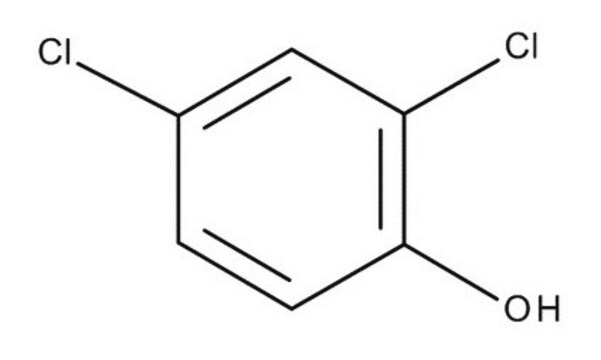105953
2,4-Dichlorophenol
99%
Synonym(s):
1,3-Dichloro-4-hydroxybenzene, 2,4-DCP, 2,4-Dichlorophenic acid, 4,6-Dichlorophenol
About This Item
Recommended Products
Assay
99%
form
solid
bp
209-210 °C (lit.)
mp
42-43 °C (lit.)
solubility
methanol: soluble 1g in 10ml
ethanol: soluble 50 mg/mL
SMILES string
Oc1ccc(Cl)cc1Cl
InChI
1S/C6H4Cl2O/c7-4-1-2-6(9)5(8)3-4/h1-3,9H
InChI key
HFZWRUODUSTPEG-UHFFFAOYSA-N
Looking for similar products? Visit Product Comparison Guide
Related Categories
General description
Application
Signal Word
Danger
Hazard Statements
Precautionary Statements
Hazard Classifications
Acute Tox. 3 Dermal - Acute Tox. 4 Oral - Aquatic Chronic 2 - Eye Dam. 1 - Skin Corr. 1B
Storage Class Code
6.1D - Non-combustible acute toxic Cat.3 / toxic hazardous materials or hazardous materials causing chronic effects
WGK
WGK 3
Flash Point(F)
231.1 °F - closed cup
Flash Point(C)
110.6 °C - closed cup
Personal Protective Equipment
Certificates of Analysis (COA)
Search for Certificates of Analysis (COA) by entering the products Lot/Batch Number. Lot and Batch Numbers can be found on a product’s label following the words ‘Lot’ or ‘Batch’.
Already Own This Product?
Find documentation for the products that you have recently purchased in the Document Library.
Customers Also Viewed
Our team of scientists has experience in all areas of research including Life Science, Material Science, Chemical Synthesis, Chromatography, Analytical and many others.
Contact Technical Service













